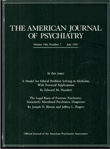Involuntary treatment in medicine and psychiatry
Abstract
It is often asserted in the debate on the right to refuse treatment that psychiatrists are the only physicians who treat patients against their will. During 11 weeks on two wards in a general medical hospital, the authors observed 18 episodes of involuntary treatment and restraint (1.17 episodes per 100 patient-days). Involuntary treatment was usually employed when the refusals of patients judged incompetent interfered with needed treatment. Restraints and psychoactive medications were the most common interventions. These data suggest that involuntary psychiatric treatment is mirrored in general medicine and has its roots in medical paternalism, rather than in the function of social control.
Access content
To read the fulltext, please use one of the options below to sign in or purchase access.- Personal login
- Institutional Login
- Sign in via OpenAthens
- Register for access
-
Please login/register if you wish to pair your device and check access availability.
Not a subscriber?
PsychiatryOnline subscription options offer access to the DSM-5 library, books, journals, CME, and patient resources. This all-in-one virtual library provides psychiatrists and mental health professionals with key resources for diagnosis, treatment, research, and professional development.
Need more help? PsychiatryOnline Customer Service may be reached by emailing [email protected] or by calling 800-368-5777 (in the U.S.) or 703-907-7322 (outside the U.S.).



